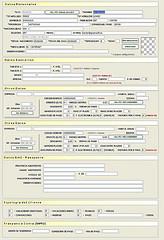 ec4u describes the typical characteristics of the two generations of CRM in Karlsruhe, October 17, 2011 – while the topic of CRM 2.0 for some time dominated the public discussion on the customer management, yet often still lack a clear distinction between the classic customer relationship management and its new version. Mario Pufahl, Member of the Executive Board at ec4u expert consulting ag, therefore a differentiated comparison made. His distinction starts with the basic definition. So CRM represents a philosophy for the marketing, sales and services in the conventional orientation, to optimize the interaction with support of corresponding software systems with. Play a crucial role in appropriate IT systems. CRM 2.0, however, is its definition a technically driven business philosophy with strategic and cultural orientation on a partnership-based collaboration with the customer. Where is the target at the Center, to create added value to the customer using CRM. The technical systems play only a subordinate role in relation to the benefit of the customer.
ec4u describes the typical characteristics of the two generations of CRM in Karlsruhe, October 17, 2011 – while the topic of CRM 2.0 for some time dominated the public discussion on the customer management, yet often still lack a clear distinction between the classic customer relationship management and its new version. Mario Pufahl, Member of the Executive Board at ec4u expert consulting ag, therefore a differentiated comparison made. His distinction starts with the basic definition. So CRM represents a philosophy for the marketing, sales and services in the conventional orientation, to optimize the interaction with support of corresponding software systems with. Play a crucial role in appropriate IT systems. CRM 2.0, however, is its definition a technically driven business philosophy with strategic and cultural orientation on a partnership-based collaboration with the customer. Where is the target at the Center, to create added value to the customer using CRM. The technical systems play only a subordinate role in relation to the benefit of the customer.
“Derived is the focus in the original CRM is more tactical and operational pronounced while CRM 2.0 is a strategic focus, where the customer management strategy embodies the strategic orientation”, emphasizes Pufahl. Also the relationship relationships differ in: business marked communication prevails In the case of a primary, however, blur business and private relations in CRM 2.0, for example, through the social networks more and more. Also the customer as a result of the proliferation of Facebook & co. determines the channels and how of their use nowadays increasingly independently, while he had to focus on the selected communication channels after the original idea of CRM. Ultimately the customer understanding has evolved with the idea of CRM 2.0 significantly”, refers to a basic difference Pufahl. Now no longer is the first and foremost about the design Processes to the customer with his supposed needs, but the direction has turned around, by the wishes and expectations of the customers for the actions of the company is determined as sensitive.